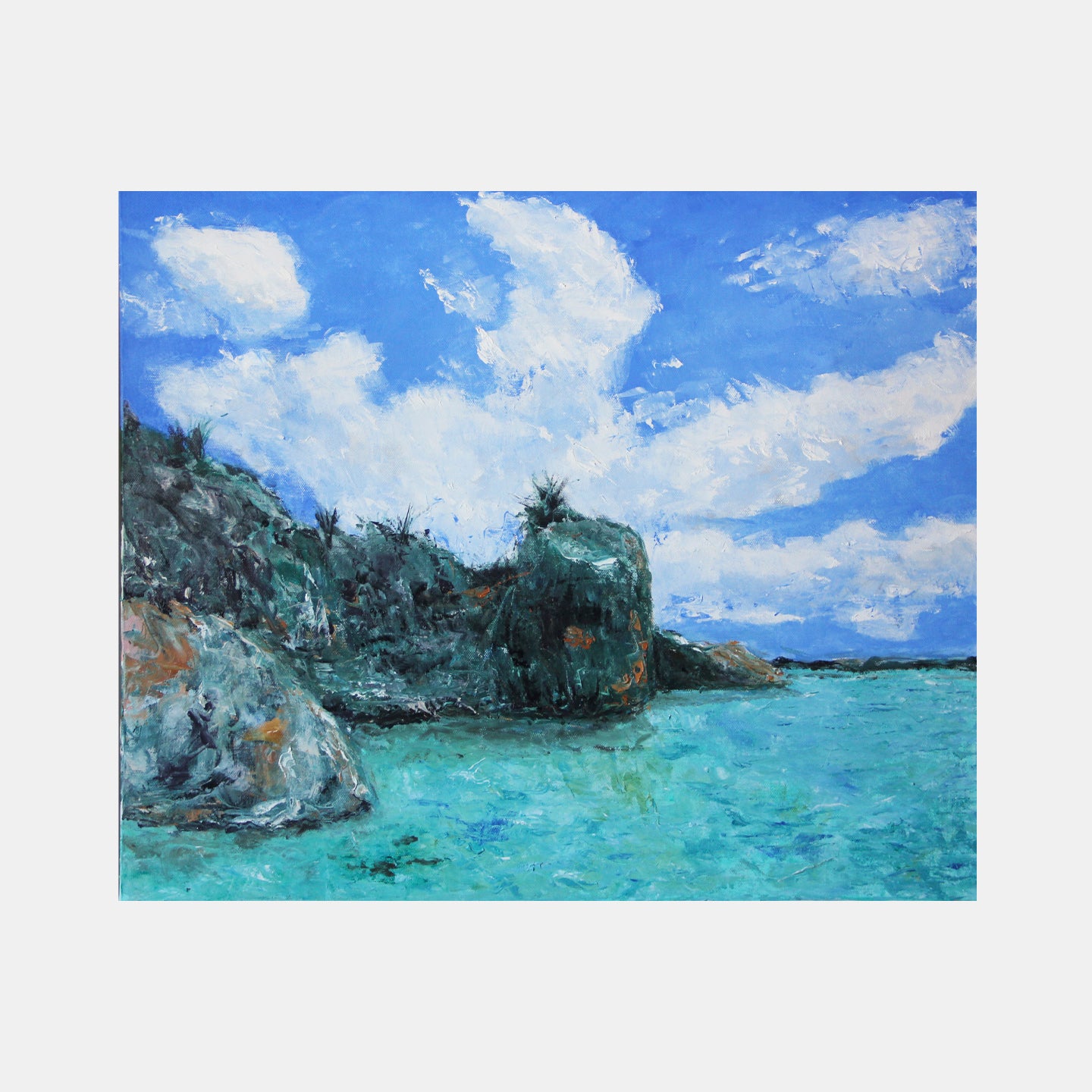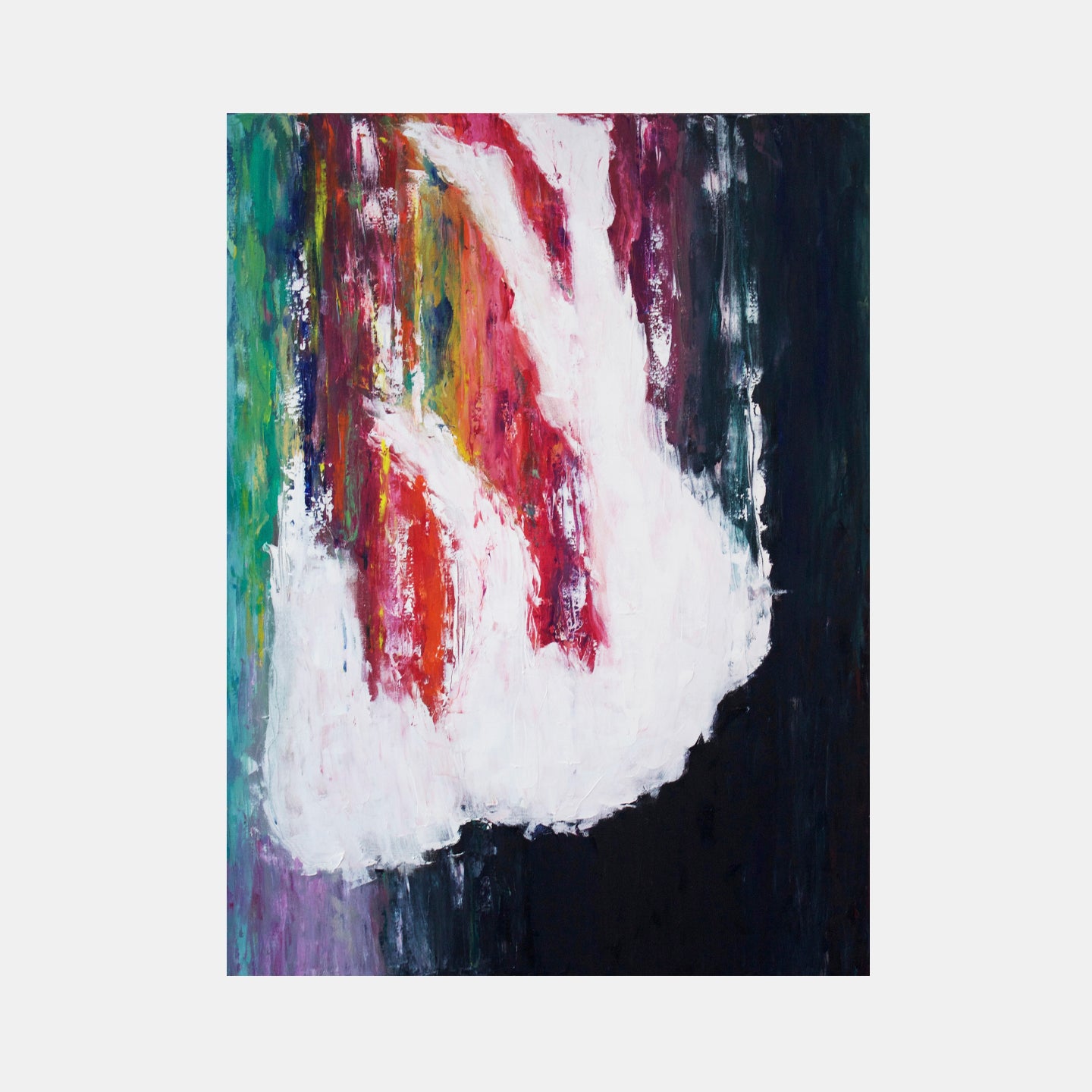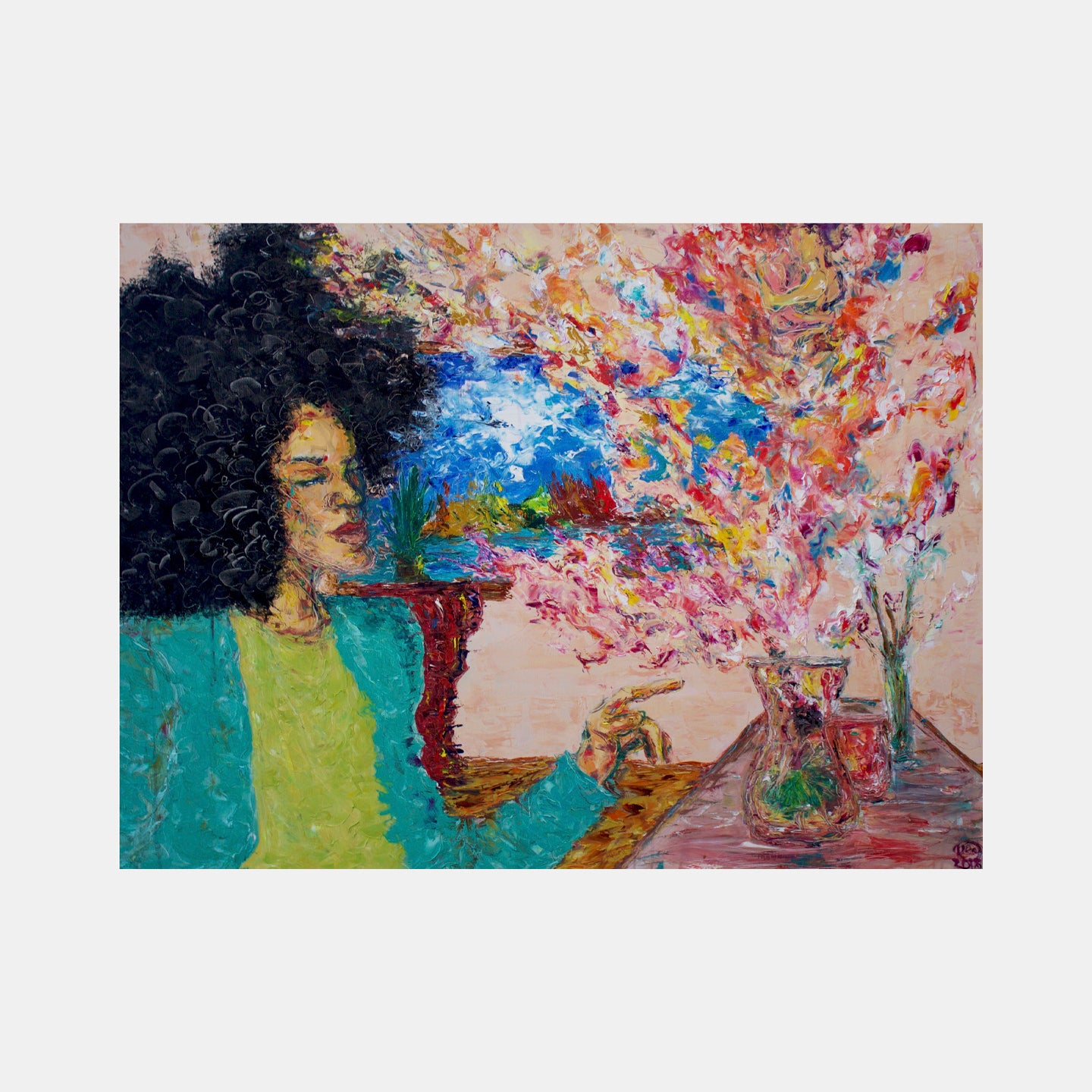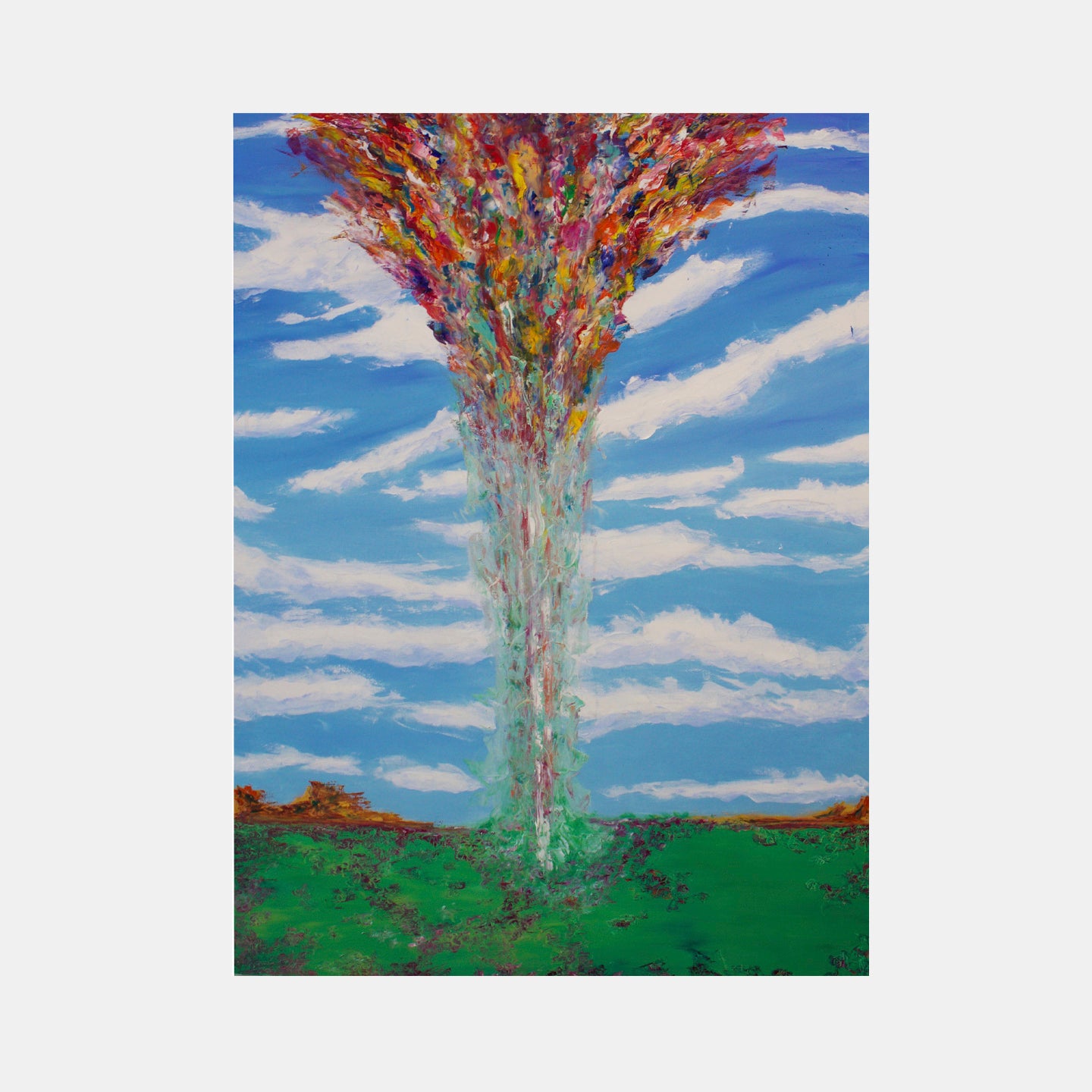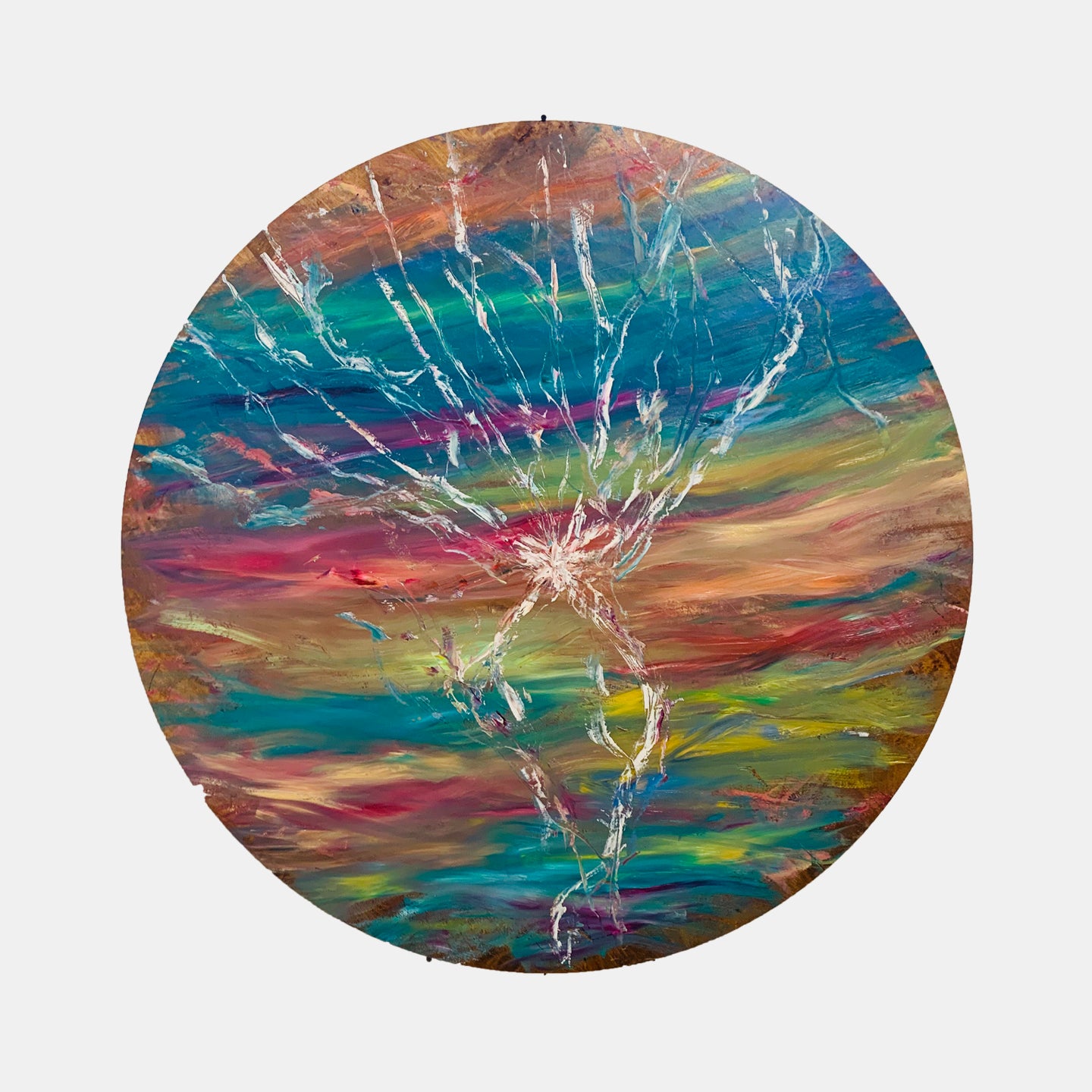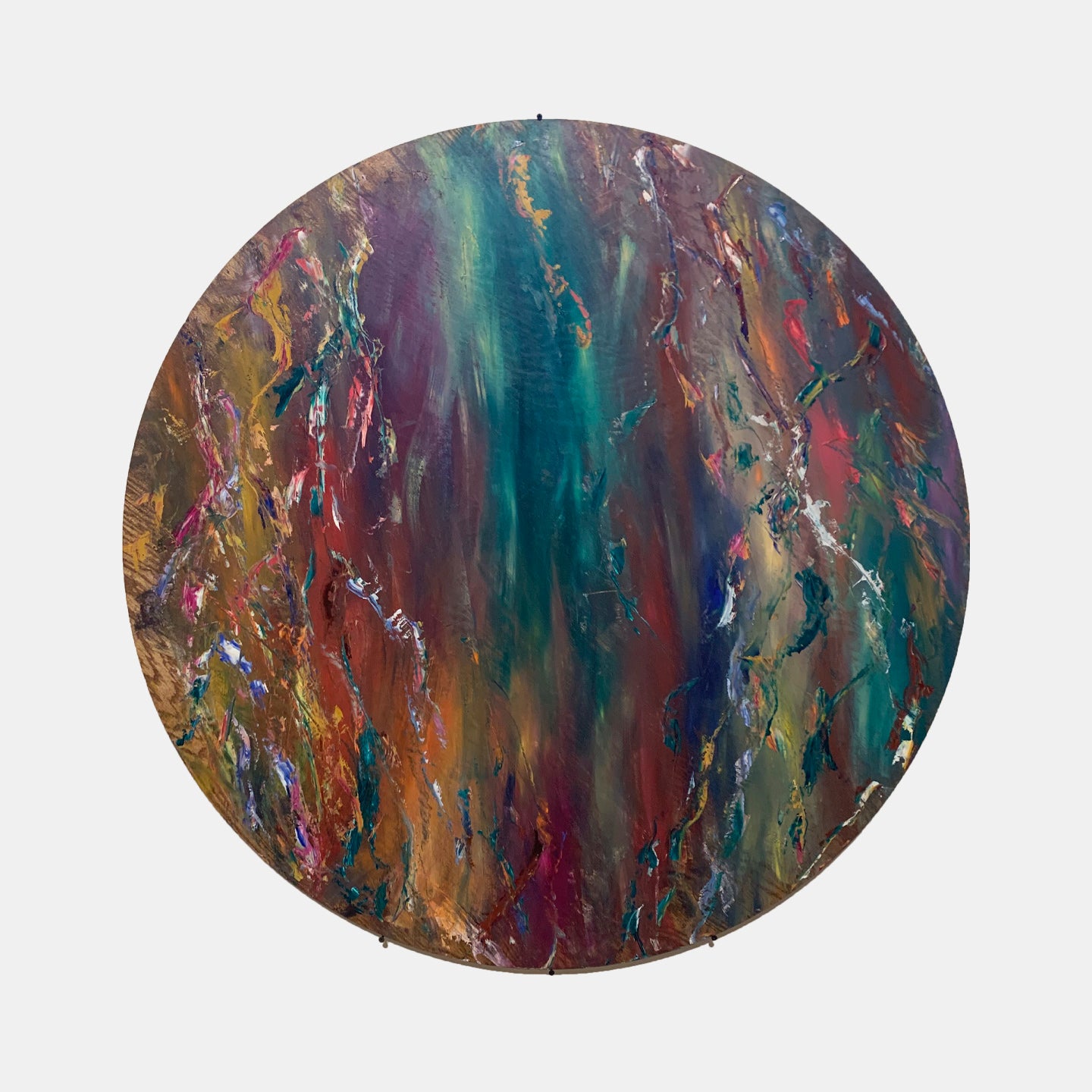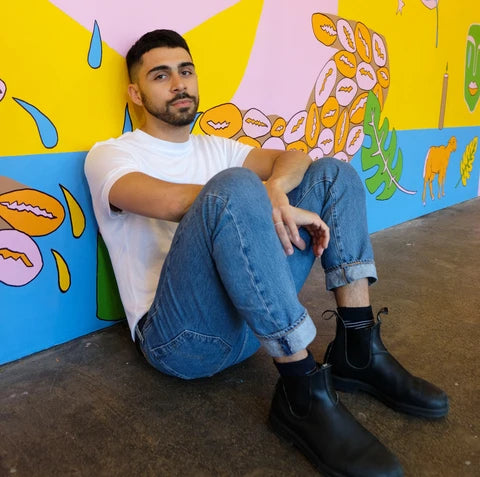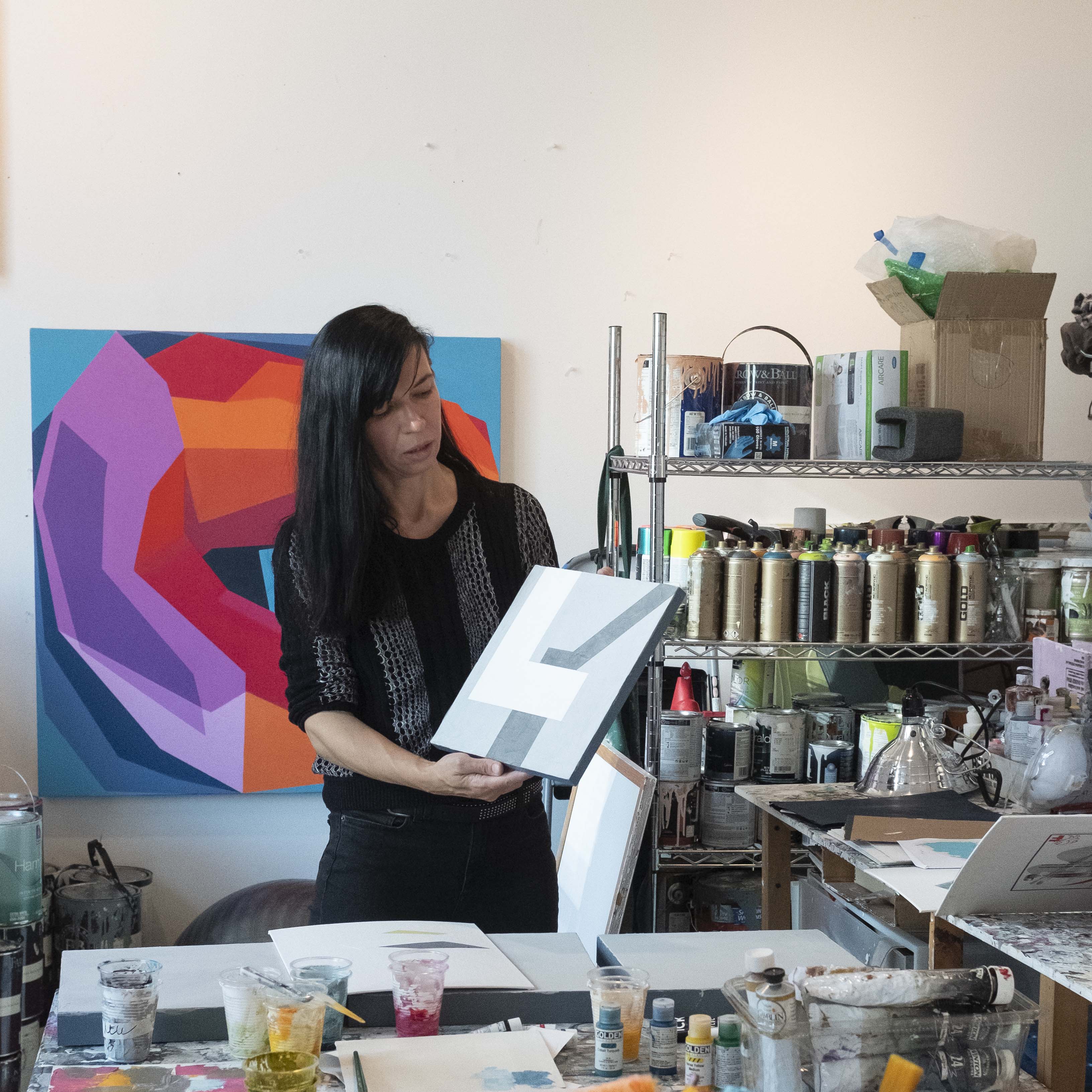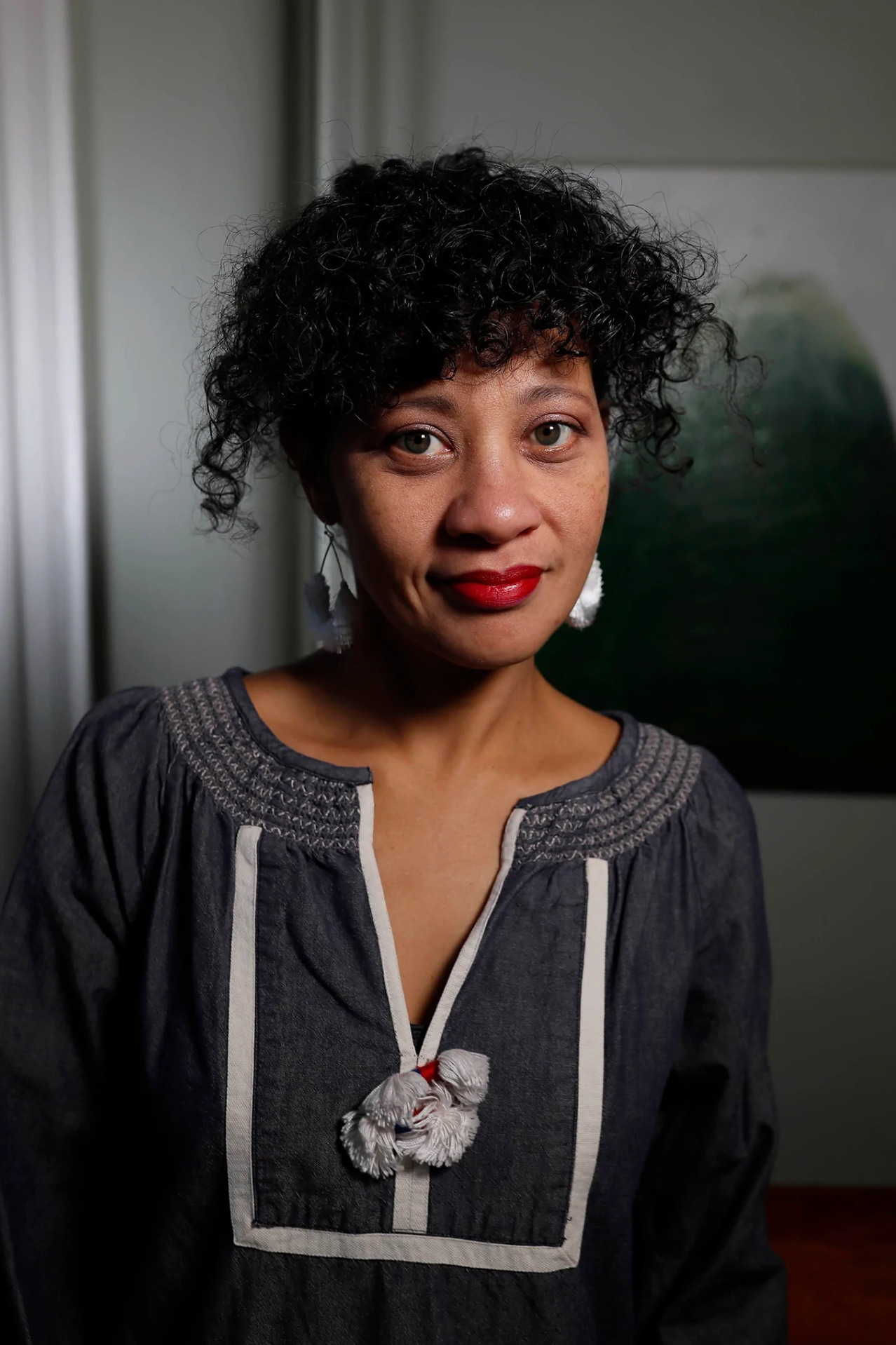No Products in the Cart
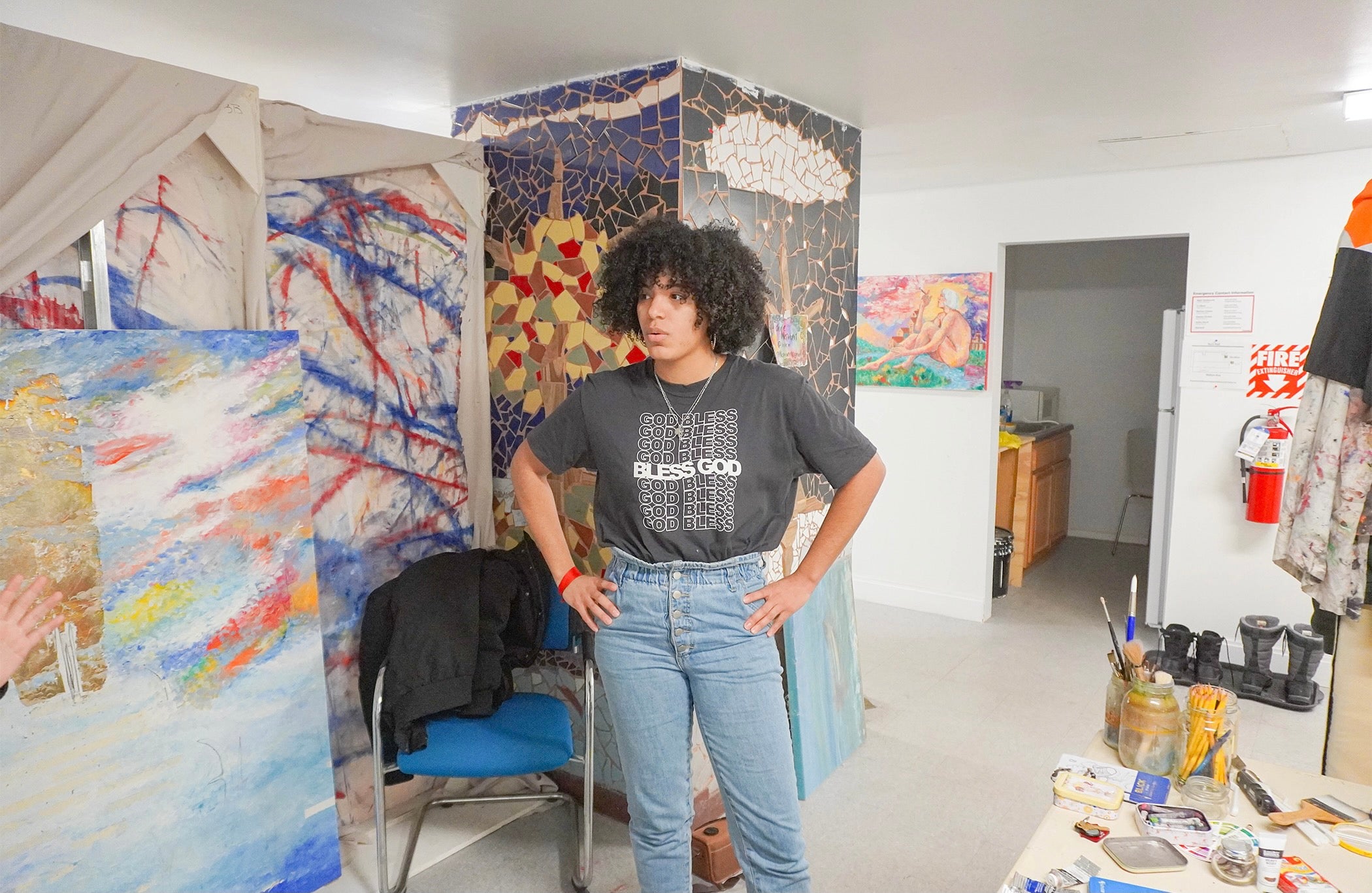

In her work and in her life, Jadie Meprivert strives to educate, inspire, and uplift others. Her work reflects her passion for fostering human relations and connection, inspired by connections made not only through her pursuit of visual art but through dance and her work as a vocalist and actor.
So now that we've introduced ourselves, can we talk about how you started out in one career path and decided to add visual arts onto your plate?
So you want me to tell my history to you? Storytime!
Yeah!
My name is Jadie Meprivert. I'm a New York City based painter, singer, actress, and performer. I'm also an educator. I didn't always start with arts- I pursued a career in english literature in college, and at the last leg of my career I decided to change my major to my love, which was art. I remember wondering to myself, 60 years from now, will you be happy with everything that you've made? Will you be happy with everything you have? and something just said no. After that I signed up for four more years of school and it changed my life forever. I was able to showcase in galleries, meet people that I would have never met before, work with youth in wonderful, dynamic places that change people's perception of what art is. I'm forever grateful that I’m able to follow my dreams.
Even after that bold turn of your career path, did your previous studies play into your art?
English lit has never left me. It's a huge part of who I am. I'm in a constant state of learning and growing, so I need those things. Those books that I read, those stories translate into the work I make now because my paintings need to tell a story to the people that see them. Sometimes I incorporate words and themes in literature into my work. I've always loved fantasies and the world inside of stories themselves so I wanted to translate that inside of my paintings.
 Your paintings do seem to work together as a narrative, for example the three fantasy-themed ones. Were there any specific influences?
Your paintings do seem to work together as a narrative, for example the three fantasy-themed ones. Were there any specific influences?
Yes.That painting was actually an assignment that was taken a little beyond. It's a combination of the things I was learning about at the time: interior design, landscape, and a bunch of others. The assignment was to combine still life, the nude, etc… I didn't want to just paint "a nude" I wanted to make it mine. So I painted this well rendered woman at first. People could recognise that it was a woman, the drawing was a drawing, you know? But as I went along it took in this Seurat, or Monet style and I've loved that expressionist style of painting ever since. And I thought, how do I make all these things fit?
I remember saying "Giant woman. It's a giant woman. Slap it right there a giant woman, and make it a fantasy, something that's beyond just drawing a woman inside of a house. I want people to look at it and think: why is she so big, why is she so small, what's the narrative behind that?". What came to be was a combination of all these concepts. So what started from an assignment took on this other message. I think it's a really whimsical moment when an artist’s work unravels in and of itself.

WORKS BY THE ARTST
Would you say you are a planner or do you work more from improvisation?
A little bit of both. My favorite professor told me "do not paint unless you feel satisfied with a drawing". So I applied it. I would draw for hours before painting, make sure that in my eyes it was "perfect". I start a lot of my paintings with a charcoal sketch, then I go over it in pencil, and then I erase the charcoal and put a watercolor over it just to see where the colors are going to go. And then I paint over it. But the painting always comes out different from the drawing. Some things never end up looking the way that I had planned them. I'm ok with that. I love that process of planning and then never ending up with what I had planned.

Are those your sketches for future paintings?
These are for my new project, a documentary called "Hope in Us". It's based on people who have overcome certain things in their lives that have propelled them to follow their dreams. More often than not, we see people's stories before and after. We don't usually see the middle- the part where they strive the most, they overcome all these difficulties.
I think that it's really important to capture because there's always someone else going through that struggle. Even though we're still figuring things out, this is the part of our lives that needs to be documented, and needs to be showcased so that someone who isn't sure what their purpose is can actually see their vision. For example when I talk to some high school students they're so flabbergasted. "You're an artist? you have your studio?" I'm like “it's not a big deal, but when I hear you say it, wow it really is.”
So I've been interviewing these people. It's so amazing to watch them release, talk, and tell their stories and sometimes their trauma- it's a very therapeutic thing. Some people say the wildest of things that make me say... that's a painting.
What i'm doing now along with the documentary is creating two books. One is for all people that have sat down with me, as a thank you. The next book that i'm making is based on sketches of their dreams. When they talk to me about their lives, and everything that's going on in it they tell me their dreams. That's the concept for the paintings. There are so many things that divide us, but we all go to sleep. We all have dreams. Not only dreams when we sleep but dreams that mean certain realizations. I think it's beautiful to watch them tell me both so I try to connect.

Wow, how do you capture the complex impressions in people’s dreams?
One thing that I wanted to do when showcasing these dreams was that I didn't want to paint people. I didn't want this figurative expression that people are able to recognise. So I decided to paint an abstract sense of people's souls. They have legs and arms, but not really. You can't tell, they only give the sense that they do. I call them star people because they look like stars. It's so important to keep things simple. Someone told me that the gospel is so simple that a child can understand, but so complex that it would go over the head of an adult. I want to apply that to my paintings.

I would love it if you could discuss some parts of your studio.
This is a little wall that I have that I started when I was in my BFA program. I started asking everyone that comes into my studio the simple question “what have you been told throughout your artistic career that has impacted you?” All these artists, all of my friends had something to say. I was interested in knowing the impressions that were made on them. Words are so powerful. Documentation is so important.
Once I heard someone say that my style was too painterly. I remember another time that I had this argument with a professor about a certain painting going out for the show. It was in front of everybody in the department. I was putting the paintings up and she was like "that painting will not go in the show". In front of everybody I said:"yes it will". That professor was my advisor! I deeply respected her, but to have that back and forth with a professor for the first time I had to learn to stand my ground but be respectful at the same time.
We don't get a blueprint about what art school's gonna be like, or even what our career is gonna look like. Even though we were formally and traditionally trained, we weren't really told about any of this, in a way. It was all about Art History and technique and not about stepping out, gallery spaces, and having a social life. Artists don't understand that we need to be social if we are going to make it out in the world. And so we need to break this picture that we have of artists "letting the work speak for itself." No! People want to listen, people want to hear you, people want to make a connection. We put artists on such a pedestal that we no longer make a connection, that they no longer look like people to us.
I dream of having this gallery show that can be interactive. Where people can leave things behind. I always thought that if i'm gonna do this, I need friends. I need the people that come in to see the show to leave knowing me completely. That I leave there knowing everything about their lives. That I leave with a new friend each and every time that I'm in a gallery. That I make a new fam, basically. It's so, so important to me that I expand my horizons, it makes my life richer.
You were saying that you eventually want to make your own art space?
I feel like god is really bringing all these things together. Whether it’s from education or my background or English. My dream -my crazy crazy dream- is to have an art center. I believe that it will be much more than an art center. I think it's important to have initiatives and non profit organizations. So my dream is to have this art center that can educate artists for free. To provide tools and resources for not just artists but for a community that needs progress. I dream of a center that gives single moms tools to study biology for free. That gives ex convicts the opportunity to get rehabilitated and get back into the working force. I dream of a day that we can put the art back on demand in a way that is just blooming, that when a kid says "i want to be an artist" to their mom, she won't cry.

In addition to visual arts and documentary making, you also said that you sing and work as an educator. Where do you work and what does that job entail?
I used to teach high school for about five years. When I pursued English and Art in college I knew that I wanted to be a teacher. So I taught at a music school and also at a high school- both in the Bronx and it was a beautiful experience.
After that I graduated and COVID happened and all that jazz. So I worked at a supermarket throughout the whole situation. When no one else was working I was out there braving it when toilet paper ran out and people were crazy. It was such a frustrating time to think that all the years of studying and sacrifices would come to nothing. I just kept writing, I just kept sketching, hoping, praying that god would just somehow turn things around and he did. I met an amazing group of people at the supermarket. I spent my time over there getting to know people and meeting amazing artists that would come by the supermarket because it was the only place that was open.
After that I ended up working at a production center, which was hard factory work. I was packaging cheese for eight hours a day. I would go to work crying. I ended up getting harrassed there by someone who used to work right next to me. It was so bad. I couldn't say anything cause I just got that job. And i thought, "there are so many people who aren't even working cause of COVID, so many people that don't even have this luxury, what do I do God?" And so after that, I went to my church and one of my pastors prayed for me. It's a crazy story. The very next day this person’s late and I found out that he had a nightmare about me, one so bad that he couldn't even talk about it. It was to the point that they had to put me somewhere else. I was so grateful.
That's the day that I reported this person. That's the day that HR got involved, witnesses came up, and that same week I got accepted into a residency program. I left that job and finally broke into all these opportunities that just opened up as soon as this storm ended. It's this gathering of all these things that have happened that inspire me to teach, inspire me to be there for the youth. I may have gone through something tough, but there's some people still going through it. There's people who have gone through worse. Not to diminish what I went through, but it fuels me to help other people, to be an educator.

Do you also have learning moments from the kids you work with?
Being a teacher is such a humbling job. You're in charge of someone else's learning, and you come second to their needs. It's an honor to teach. I learn a lot from students, teaching high school and elementary school. How to be more patient, how to be a better person. there's certain things in art that they do that I never learned in school. It's just pure instinct, their spirit's just flying through the page. and I'm like "you know this painter did this years ago, and you don't even know that you're doing it. You never learned about it, you're doing it out of your own mind, your creativity." What's the point of an art education when you can unleash your mind?
Can you tell me more about how working here in Chashama studios, and in this neighborhood more generally affects your workflow?
Working here is a blessing because I live in the Bronx and this is in the Bronx. In my last studio I had to get to Governors Island. It was awesome, such an open space, but working here is better in terms of distance for me. I grew up around here as well, so I know this area. It's even changed the way that I work. I love being able to connect with people, and since this is a residential building I walk over here, meet someone new, and then get to work. The space is amazing, I feel at home.



